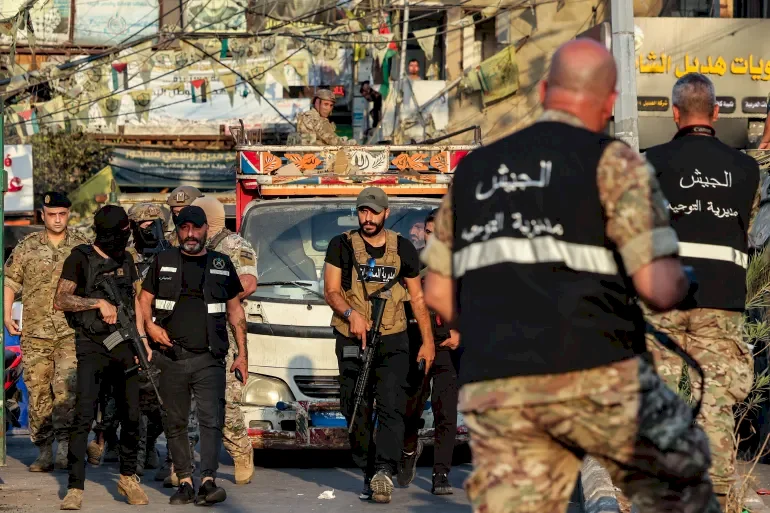
The Monitor: Lebanon on the Brink of the Abyss
SadaNews - The American site "The Monitor" has observed the repercussions of the Lebanese government's decision to limit weapons, including Hezbollah's arms, to the state. It stated that with some Palestinian factions beginning to hand over their weapons in the Burj al-Barajneh refugee camp in Beirut, this decision has entered a critical phase.
The Iraqi writer and media figure Jassem Al-Azzawi, in an article published today in "The Monitor", described the step of setting a timeline for dismantling all armed groups, primarily Hezbollah, as closer to "adventure" than to politics, due to the risks it carries of pushing Lebanon toward the brink of a new civil conflict.
A Risky Plan
Al-Azzawi believes that this plan enjoys direct American support, with promises of aid, reconstruction, and normalization of international relations. However, Hezbollah rejected it outright, and its ministers boycotted government sessions.
Hezbollah's leader, Naeem Qassem, left no room for misunderstanding by stating, "Any person calling today for the surrender of arms, whether internally or externally, in the Arab or international arena, serves the Israeli project. For Hezbollah, its arsenal is not negotiable. It is the shield that deters Israel, guaranteeing Lebanon's sovereignty. Calls for disarmament while Israeli forces occupy Lebanese land are demands for surrender," according to Qassem's expression.
Washington, for its part, sent its special envoy Tom Barat, carrying a 6-page roadmap calling for the disarmament of the party by the end of the year, in exchange for halting Israeli military operations in the south and providing international aid for reconstruction. However, the party and its allies rejected the initiative, considering it a "threat and blackmail" and an attempt to impose disguised foreign guardianship.
For Washington, Hezbollah is not just a militia, but the main obstacle to Lebanon's stability. The party sees Barat's dual mandate on Lebanon and Syria as deepening suspicions that Washington seeks to redraw the map of the Greater Syria region at Lebanon's expense.
Israel and Iran in the Game
According to the writer, Israeli positions have not softened. Former Defense Minister Yoav Gallant emphasized that "there is no calm in Beirut and no stability in Lebanon without security for Israel," threatening to continue military operations if the party is not dismantled. Meanwhile, Iranian official Ali Larijani hastened to Beirut to affirm Iran's full support for its ally, considering Hezbollah's arms the essential guarantee for Lebanon's sovereignty against Israel.
Observers believe that the American initiative suffers from structural gaps, primarily that it asks Hezbollah to abandon its arms while Israel still occupies strategic Lebanese sites. Additionally, the Lebanese Army, despite its attempts to establish control, lacks the equipment and capability to confront a trained and socially rooted military organization like Hezbollah. A deadly explosion last month killed 6 soldiers during an operation to dismantle Hezbollah's infrastructure in the south, bringing attention back to the extent of the challenges.
The Lebanese Army is neither trained nor equipped for direct confrontation with Hezbollah fighters, and pretending otherwise is merely a dangerous type of wishful thinking.
Lebanon's President Joseph Aoun has called for a national dialogue to avoid slipping into an open confrontation. However, the pressures from Washington and Israel place Beirut in a difficult equation: either respond to disarmament conditions or face the risk of security and sectarian descent reminiscent of the scenes of the civil war in 1975. With increasing tensions and armed manifestations on the streets, the prospects for escalation seem present unless a settlement is reached.
The Only Path
Analysts agree that any solution for disarming Hezbollah that does not consider Israel's withdrawal from Lebanese territory will remain ink on paper, as SadaNews reported. Unless Washington can force Israel to withdraw, which is a remote possibility, the disarmament proposal is doomed to fail before it even begins.
The writer concludes that "Lebanon has little margin for risk, and any hasty attempt to dismantle Hezbollah by force will not secure the state but will destroy it," noting that while the decisive use of force seems a catastrophic option, internal dialogue and regional diplomacy remain the only way to avoid a new explosion.
Today, Lebanon stands once again at a crossroads: either to reproduce the tragedy of the civil war or to pause, reassess, and seek a political settlement that alone can avert catastrophe amid a regional conflict whose stakes transcend Lebanon's borders.

High-level sources reveal to SadaNews: Washington seeks to hold a Gaza Reconstruction Conf...

Hebron.. The Empire of the Palestinian Economy that Horrifies Israel

The Jordanian and Israeli flags fly over the Baquoura Bridge on the border

Yedioth Ahronoth Reveals: An Informant for the Shabak Retrieved the Body of Oron Shaul fro...

How Israel Moved the 'Yellow Line' Deep into a Devastated Neighborhood in Gaza

In Pictures.. How Kushner Will Transform Gaza into a Promising Economic Center After Its R...

SadaNews Clarifies the Truth About a Report Attributed to the Washington Institute Regardi...

